Discover and share opportunities to publish and participate in conferences and workshops, or to apply for grants.
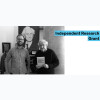
Independent research grant 2026
deadline: 04.03.2026
category: Research grant / fellowship / scholarship
keywords: Indipendent research
The Zukunftskolleg of the University of Konstanz
The funding programme aims to promote independent research by postdocs at the University of Konstanz. We especially encourage researchers in the early phase of their career to apply. The Zukunftskolleg invites applications for financial support of up to EUR 7,000 for projects that help the individual applicant attain scientific independence. In particular, we encourage applications to support exploration of new ideas and in carrying out pilot projects, including collaborations with partners at international academic institutions. The grant may cover consumables, equipment, travel costs and student research assistants. Funding of doctoral or postdoctoral positions is excluded.
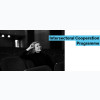
Zukunftskolleg Intersectoral Cooperation Programme 2026
deadline: 04.03.2026
category: Research grant / fellowship / scholarship
keywords: Intersectoral Cooperation
The Zukunftskolleg of the University of Konstanz
This programme aims to develop cooperations between researchers (non-tenured) of the University of Konstanz and the non-academic sector both from Germany and abroad. The involvement of one Fellow of the Zukunftskolleg in the project should be aimed for. Grants will be given to support cooperations that foster joint research projects with mutual benefits, research dissemination and public outreach initiatives. The programme provides opportunities for researchers to work with industrial partners, companies, social institutions, cultural institutions, archives, public bodies, or non-profit organisations. Different forms of collaboration are possible as long as the projects can be shown to involve substantial and balanced involvement from all partners and produce mutual benefits. Possible collaborations could take form of (non-exhaustive list): implementation of research projects, tests or experiments, co-production of academic publications, organisation of scientific workshops, conferences or public events, realisation of field studies, development and implementation of teaching courses or planning of exhibitions
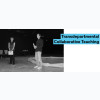
Zukunftskolleg transdepartmental collaborative teaching 2026
deadline: 04.03.2026
category: Research grant / fellowship / scholarship
keywords: Collaborative Teaching
The Zukunftskolleg of the University of Konstanz
This funding programme aims at promoting the development of new teaching courses and at contributing to the departmental syllabi. The programme gives grant holders the opportunity to explore new, innovative topics in teaching, to further develop their teaching skills and to evolve teaching approaches across disciplines. New teaching formats are particularly encouraged. Recipients must deliver the course in the winter term 2026-2027 at the latest. The courses need to be taught by the researchers (non-tenured) from at least two disciplines represented at the University of Konstanz. Preference will be given to projects involving one fellow of the Zukunftskolleg. Financial support will be given, e.g. to invite guest speakers both from Germany and abroad, organize visits to archives, museums, or perform experiments.
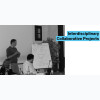
Zukunftskolleg Interdisciplinary collaborative projects 2026
deadline: 04.03.2026
category: Research grant / fellowship / scholarship
keywords: Collaborative Research
The Zukunftskolleg of the University of Konstanz
In line with the multidisciplinary character of the Zukunftskolleg, the programme is open to all non-tenured researchers, holding a PhD (e.g. postdoctoral researchers, research group leaders, Junior Professors etc.) of the University of Konstanz. Projects involving non-tenured researchers from other universities worldwide are also welcome. Aim - The funding programme aims to promote research collaborations between researchers (non-tenured). Collaborative projects involving doctoral researchers will be also considered. An interdisciplinary research project gives grant holders the opportunity to identify and explore new, innovative and/or risky research perspectives with neighbouring disciplines and across disciplines. The grant may cover consumables, staff (student assistants), the costs for a retreat, a research meeting or a workshop.
PRICE/PREMIO "Most Promising Researcher in Robotics and Artificial Intelligence"
deadline: 08.03.2026
category: Research grant / fellowship / scholarship
keywords: nnovatività, livello di maturità tecnologica, impatto scientifico, sociale ed economico, sfide ancora aperte
Fondazione Mondo Digitale ETS and Corriere della Sera
Premio da assegnare a giovani ricercatrici e ricercatori, dottorande e dottorandi, impegnati in progetti di ricerca in ambito robotica e/o intelligenza artificiale.
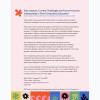
Past Lessons, Current Challenges and Future Horizons: (In)Equalities in Post-Compulsory Education
deadline: 09.03.2026
category: Event
(02.06.2026 11:00 - 16:00)
keywords: Post-Compulsory Education, Past, Present & Future, Inequalities
Social Justice & Transformation Group from the University of Portsmouth
,
The Education
The Education, Social Justice and Transformation (ESJT) group at the University of Portsmouth is pleased to announce our first mini-conference and call for proposals. We are open to any proposals that speak to the broad focus of the event: past lessons, current challenges, and future horizons for (in)equalities in post-compulsory education. This might include what we can learn from our educational pasts; educators under attack in different contexts; the educational consequences of local and global crises; how we respond to the systemic change around us; and how we can form solidarities and hopeful possibilities for the future of education. The conference is interdisciplinary, so welcomes contributions from any subject specialisms or multi-disciplinary perspectives. We are also interested in showcasing the work and ideas of educators and researchers from all post- compulsory settings, whether that be further education, higher education, community education, alternative provision, or other contexts.
Awards for Excellence in Biotechnology & Artificial Intelligence
deadline: 10.03.2026
category: Research grant / fellowship / scholarship
keywords: Award; Excellence; Biotechnology & Artificial Intelligence
Cometee of the International Conference on Artificial Intelligence
,
Cyber Security & Biotechnology (AICSBC)
EVALUATION CRITERIA To be considered for this honor, an institution must demonstrate strength across areas: - Research Excellence & Scientific Impact - Collective Publication Record - Innovation & Intellectual Property (IP) - Grant Management & Funded Research - Technology Transfer & Industrial Linkages - Organizational Leadership & Ethics
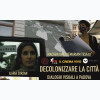
Anti-Racism, Social Justice and the European City
deadline: 15.03.2026
category: Event
(06.07.2026 09:00 - 11.07.2026 18:08)
keywords: Anti-Racism, Social Justice, European Cities
Anti-Racism
,
Social Justice and the European City (ARJEC) / University of Padua (IT)
Combining scholarly conversations and collective actions, the Summer School on Anti-Racism, Social Justice and the European City (ARJEC) is an independent, collaborative platform bringing together postgraduate students, activists and scholars. Across one intensive week, participants will engage each morning with advanced seminars in urban studies, critical race approaches and decolonial theory. Afternoons are dedicated to collaborative project work in small groups, learning from and contributing to local grassroots campaigns. -------- Applications are open to Masters and PhD students based at any institution. Limited funding available (see Fees and Application). 3 ECTS + Participation Certificate
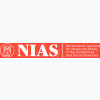
NIAS Theme Group Fellowships
deadline: 16.03.2026
category: Research grant / fellowship / scholarship
keywords: Humanities; Social Sciences
NIAS Theme Group
NIAS Theme Group Fellowships are awarded to scholars from both the Netherlands and abroad. Applicants should have at least three years of academic experience since obtaining their PhD, and their project proposal should be related to the fields of Humanities and Social Sciences. These fellowships are also open to scholars who do not hold a permanent position at a university or research institute. The working language at NIAS is English, and applicants are expected to have a strong command of the language in order to contribute fully to the fellows’ group and to benefit from feedback on their own research. NIAS seeks to assemble a balanced cohort each year, reflecting a diversity of academic cultures, gender, career stages, and disciplines.
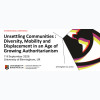
IRIS CONFERENCE - Unsettling Communities: Diversity, Mobility and Displacement in an Age of Growing Authoritarianism
deadline: 16.03.2026
category: Event
(07.09.2026 09:00 - 09.09.2026 18:00)
keywords: mobility, migration, displacement, authoritarianism
The Institute for Research into International Migration and Superdiversity (IRIS)
,
University of Birmingham
We are living in times where profound and intersecting geopolitical, economic, environmental and ideological crises are shaping diversity, mobility and displacement. Armed conflicts and protracted wars—from Ukraine to Gaza—continue to displace millions, while climate breakdown, a widespread drift towards authoritarian rhetoric and far-right politics alongside economic collapse drive large-scale mobility and immobility across and within regions, including from Venezuela, across the Sahel, and throughout Central America. The current world order is thus increasingly characterised by change and instability. These changes have major ramifications including intensifying border violence, the introduction of increasingly selective mobility regimes and the erosion of international protection frameworks. Faced with this disruption, political and activist communities are forging new alliances across difference and mobilising in radical new ways to re-imagine collective power and belonging. In this context, the study of diversity, migration and displacement is both more urgent and more challenging than ever. How can scholarship respond to these transformations without reproducing dominant framings of crisis, threat or invasion? What concepts, methods and alliances are needed to understand—and contest—this moment?
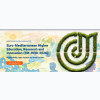
Euro-Mediterranean Higher Education, Research and Innovation (EM-HERI 2026)
deadline: 21.03.2026
category: Event
(23.06.2026 09:00 - 18:30)
keywords: Sustainability, Open Science, Innovation, Cooperation
Arab League Educational
,
Cultural
,
and Scientific Organization (ALECSO); Euro-Mediterranean University (EMUNI); European Institute of the Mediterranean (IEMed)
The Arab region and the wider Euro-Mediterranean area are facing interconnected challenges related to climate change, sustainable development, technological transformation and youth employment. Higher education, research and innovation systems are central to addressing these challenges by strengthening human capital, advancing scientific knowledge, promoting entrepreneurship and supporting the transition towards green and inclusive economies. Thematic Areas Contributions are welcome on topics including, but not limited to, the following: Theme 1: Sustainability and Climate Action in Higher Education Theme 2: Open Science and Knowledge Access in the Arab and Euro-Mediterranean Context Theme 3: Research and Innovation for Sustainable and Inclusive Development Theme 4: Green Skills, Youth Employability and Future Careers Theme 5: Entrepreneurship, Innovation and Economic Diversification Theme 6: Arab–Euro-Mediterranean Cooperation in Higher Education, Research and Innovation
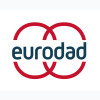
Connecting the dots: Linking economic, gender and climate justice to tackle global challenges
deadline: 26.03.2026
category: Research grant / fellowship / scholarship
keywords: Economic justice; Climate justice; Gender justice; Youth activism; Capacity building; Advocacy & campaigning; Transnational networks; Financing for development
EURODAD - european network on debt and development
“Connecting the Dots” is a four-year project that started in June 2024 funded by the EU DEAR programme, focused on educating and empowering EU citizens, in particular young activists, to tackle global challenges through the interconnected lenses of economic, gender and climate justice. The project promotes knowledge-building and the creation of tools, and spaces for capacity building, networking, campaigning and advocacy. It engages media, educators, and decision-makers to amplify narratives and drive systemic change by connecting local and international efforts. A key element of the project is three major joint pan-European campaigns focused on economic justice and financing for development (implemented in 2025), climate justice (planned in 2026) and gender justice. This project is implemented by a consortium of nine diverse and experienced partner organisations from across the EU. The consortium includes both national member-based organisations and national organisations with strong connections to local and international networks. Collectively, these organisations bring extensive expertise in areas such as debt, tax, gender, environmental and climate justice, financing for development, and development cooperation.
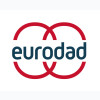
Call for grant applications - Connecting the dots: Linking economic, gender and climate justice to tackle global challenges
deadline: 26.03.2026
category: Research grant / fellowship / scholarship
keywords: Europe; mobilisation and advocacy for economic, gender and climate justice; sustainable development
EU DEAR programme
“Connecting the Dots” is a four-year EU DEAR-funded project (June 2024–) that educates and empowers EU citizens—especially young activists—to address global challenges through integrated economic, gender and climate justice. The consortium of nine pan‑European partners, led by Eurodad, builds knowledge, tools and capacity for networking, campaigning and advocacy, engaging media, educators and decision‑makers. Key activities include capacity‑building subgrants to youth-led and grassroots groups, and three pan‑European joint campaigns (economic justice/financing for development in 2025; tax & climate in 2026; gender justice in 2027) to mobilize broader public participation and strengthen coordinated civil‑society action.
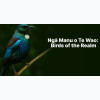
22nd Gender and Education Association Conference 2026 - Ngā Manu o Te Wao: Birds of the Realm
deadline: 31.03.2026
category: Event
(29.11.2026 21:00 - 03.12.2026)
keywords: Gender; Intersectionality; Education; Posthuman; Ecopedagogy
Gender and Education Association & Auckland University of Technology
The magic of the birds in flight inspires us—as academics, educators, activists, artists and scholars of gender and education—to speculation and to innovation. Casting our eyes upwards to follow the brilliance of the Toroa (albatross) as it glides into the ether, with it we begin to see beyond boundaries, that are now opened up in the sheer expanse of the sky. The limits are moved, shaken, survived, reinscribed, and urged onwards and upwards by these messengers of the gods riding on the winds. For us here, journeys will be taken in our fields and practices, that are replete with the old memories of the currents and that will cast new lines of flight. Inspired by this whakataukī, we welcome presentations that explore: - Border-crossings and by-ways: storying intersectionality in education - Gender and education in the political zeitgeist - Multiplicities, pluralities in gender and sexuality education as sites of becoming - Poetries, arts-based pedagogies as gender activism - Postcolonial intersections and encounters in Aotearoa, the Pacific and beyond - Philosophy and pedagogy across gender boundaries - Nomadic theory as feminist pedagogy - Hydrofeminism and education - “We make the road by walking”: gender and ecopedagogy - Pacific feminist climate activism as global pedagogy - Gender and class - Taking flight with posthuman feminism - Gender(ed) becomings with the more-than-human - Murmurations and collective movement - Looking to the skies and dreaming otherwise
SOAS Sino-British Fellowship
deadline: 31.03.2026
category: Research grant / fellowship / scholarship
keywords: Sino-British Fellowship
SOAS University
SOAS receives a generous grant from the Sino-British Fellowship Trust (SBFT), established by the late Dr Elizabeth Frankland Moore, to support individual or co-operative research projects. Research may be conducted either in Britain or in China, or in both countries. Fields in which grants have regularly been approved by the Trustees: • Physical Sciences (including Mathematics) • Life Sciences: Social, Psychological and Behavioural Sciences • Environmental Sciences: Technology (including Engineering), Medicine and Health • Education: Humanities, Liberal arts, Chinese language studies SOAS staff and research students (over the age of 25) visiting China are eligible, as are senior staff and research students at Chinese institutions visiting SOAS. This includes Hong Kong, but not Taiwan. SOAS research students will also be required to provide a reference from their main supervisor supporting the application, including an assessment of the stage of work and the prospect for completing the PhD.
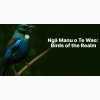
Ngā Manu o Te Wao: Birds of the Realm Conference
deadline: 31.03.2026
category: Event
keywords: Māori Indigenous knowledge; Gender and education; Queer & feminist pedagogy; Entanglement (Barad); Ethics of joy / liberation; Ecologies & place-based imaginaries
Gender & Education Association
The birds of Aotearoa--ngā manu--gift us unique inspiration and metaphor. They are ubiquitous characters in whakataukī (Māori proverbs) and pūrākau (Māori narratives) and come to us as both a gift of the whenua (land) and as timeless oracles out of the archives of our kaitiaki (custodians). They are also always in time, if we notice them out of the corner of our eye, flitting from branch to branch like Pīwakawaka, or, like the Kākāpō, making a raucous mess of the rimu fruit, watching the forest through the night with its burrowing sisters, the Roroa and the Tokoeka. Whakataukī and Pūrākau speak to us in the present, awakening us again to inspiration in the field of Gender and Education. Here birds have the power to draw us into both old/new ways of thinking and old/new gratitude for a world that is always becoming. Birds draw us into dreaming—dreams appearing as they do like mischievous Kererū in the Kōwhai tree, heralding the myriad potentialities ahead, possibilities of healing, chatter, restoration, playfulness, rejuvenation, resistance, transformation in queer and feminist experiences in education and in society. Perhaps in a beautiful entanglement (Barad, 2007), the whakataukī and pūrākau of the birds meets Hélène Cixous’ dreams of birds, and together they symbolise generative acts of liberation, queering the proper, of belonging, drawing up the creative and unbounded song of the Kōrimako that sings to us of the possibility of an ethics of joy (Braidotti, 2018) in the expectation of difference, buoyed by the curiosity of Tui and the resilience of Kōkako as life giving tenets of a liberating pedagogy (hooks, 2014). There is an encounter in this, of what is Indigenous, with that far away, a pandemonium of philosophies, feminisms, pedagogies, ecologies, activisms and poetries meeting each other over the motu (island), but also, we find bird-life in the treetops, under fern fronds, nested in gullies and deep in the mountains, all in bird-form soaring, (flightless or in flight). Haere mai. Welcome.
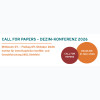
DeZIM-Konferenz 2026 "Die umkämpfte Normalität der Migration"
deadline: 31.03.2026
category: Event
Deutsches Zentrum für Integrations- und Migrationsforschung DeZIM e.V.
Migration, Flucht und Zugehörigkeit stehen im Zentrum gesellschaftlicher Aushandlungsprozesse. Doch jenseits aktueller Polarisierungen stellen sich grundlegende Fragen nach Treibern und Prozessen des gesellschaftlichen und politischen Wandels: Wie sind die Konflikte um Migration historisch und strukturell eingebettet? In welchen Kontexten sind Migration und Vielfalt wenig umstrittene Normalität? Wozu führen „Ungleichzeitigkeiten“, ein Nebeneinander unterschiedlicher Konfliktintensitäten und -logiken? An welchen Konfliktlinien werden rechtsstaatliche Prinzipien zugunsten antidemokratischer oder illiberaler Politik angegriffen? Mit diesem Zugang untersucht die Konferenz aus interdisziplinärer Perspektive, wie globale Krisen, transnationale Verflechtungen, nationale Diskurse sowie lokale Erfahrungen langfristige Verschiebungen von Solidarität, Exklusion und Demokratie formen. Ziel ist es, Konflikte nicht nur als Symptome der Gegenwart zu lesen, sondern als zentrale Dynamiken gesellschaftlicher Transformation und Zukunftsfähigkeit zu analysieren. Die Konferenz versteht sich als interdisziplinäres Forum für Austausch und Vernetzung zwischen Wissenschaft, Politik und Praxis. Eingeladen sind Wissenschaftler*innen aller Karrierestufen sowie Akteur*innen aus Politik, Verwaltung, Zivilgesellschaft und Praxis, die zu den Themen Migration, Integration, Rassismus und Konflikten arbeiten.
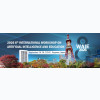
8th International Workshop on Artificial Intelligence and Education (WAIE)
deadline: 05.04.2026
category: Event
(26.09.2026 - 29.09.2026)
keywords: AI in education; Intelligent learning systems; Educational robotics
Japan
,
Japan
,
Kogakuin University
,
co-hosted by Hokkaido University of Science
,
co-sponsored by Central China Normal University
WAIE is an annual event which aims at a key theme on Artificial Intelligence and Education. It is intended to provide a stimulating forum for researchers, scientists, engineers and practitioners to present their latest research findings, ideas, developments and applications in all aspects of Artificial Intelligence and Education. It will include keynote addresses by eminent scientists as well as plenary, special and regular presentation sessions. Peer review of all the papers will use a blind process and acceptance will be based on quality, originality and relevance. We welcome submissions concerning any branch of the Artificial Intelligence and Education, and their applications in education, and other subjects. The subjects include Artificial intelligence algorithms in education, Artificial neural networks in education, Knowledge Science and Knowledge Engineering, Educational robotics, Intelligent virtual reality based learning systems, etc, and their applications
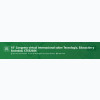
18° Congreso virtual internacional sobre Tecnología, Educación y Sociedad, CTES2026
deadline: 30.04.2026
category: Event
(28.05.2026 - 29.05.2026)
keywords: Tecnología, Educación y Sociedad
CENID
El propósito de la conferencia es crear una plataforma de debate para científicos, profesionales e investigadores nacionales e internacionales para compartir sus experiencias, mejores prácticas e ideas de vanguardia en I + D, las innovaciones y descubrimientos en el campo de la educación.
Convocatoria 2026 número regular - Revista Chilena de Pedagogia
deadline: 30.04.2026
category: Publication
keywords: Teoría del pensamiento educativo y pedagógico, Tecnologías digitales e inteligencia artificial
Revista Chilena de Pedagogía
La revista recibe artículos con un rango temático variado, que incluye: - Teoría del pensamiento educativo y pedagógico - Estudios curriculares - Procesos didácticos - Actores de la educación - Política pública educativa - Formación docente inicial y continua - Educación pública y justicia social - Tecnologías digitales e inteligencia artificial
Innovative and transformative approaches to quality inclusive education in international contexts
deadline: 30.05.2026
category: Publication
Beijing International Review of Education
It has been just over 30 years since the Salamanca Statement was endorsed by 92 governments and 25 international organisations in 1994, which marked an internationally shared commitment to inclusive education (UNESCO, 1994). The UN Sustainable Development Goals further affirm the indispensable role of quality inclusive education for a peaceful and sustainable future of the globe (UNESCO, 2015). While the definition of inclusive education is often contested, it can be usefully understood as a process that aims to maximise the presence, participation, and achievement of all students regardless of their backgrounds, and minimise any form of marginalisation, discrimination, and exclusion (Ainscow et al., 2006). Inclusive education requires an education system to adapt to student diversity through systematic changes, ranging from policy and resource distribution at a macro-level to classroom pedagogy and support at a micro-level. Inclusive education is to respect a student’s right to dignity, and it is every educator’s responsibility to build a learning environment with the right conditions for inclusion (Cantali et al., 2025). In the past few decades, we have seen landscape shifts in many countries with a growing recognition and valuing of student diversity in classrooms. The ways that countries address equality and equity issues in education systems tend to vary depending on complex economic, social, cultural, and political factors. For instance, in China, a traditional special education system operates as a way to ensure that resources and services are in place for children with disabilities, the country’s most vulnerable group to exclusion in education, while tremendous efforts have been made recently to increase access to regular schools and improve inclusive practice by reshaping teacher education programmes (Wang, 2023). In contrast, in Scotland, its unique Additional Support Needs system reaches nearly 40% of its student population and all teachers are expected to be competent in inclusive practice, whereas it still faces issues that compromise what the support system sets out to achieve (Morgan 2021; Scottish Government, 2025). There won’t be a single unified solution that can be uncritically applied across international contexts. This does not undermine the difference it makes to our understanding when we learn about, in more depth, how progress is made and how challenges are overcome in one another’s social-cultural context. Indeed, there have already been many examples that demonstrate the importance of learning across contexts (e.g., lesson study). Therefore, this special issue will bring together the latest research that adds to the global learning of innovative and transformative approaches to quality inclusive education. The collection is intended to contribute to the conceptualisation of inclusive education and create a positive impact on the future development of policy and practice.
Sección 7 – Perspectivas decoloniales en la enseñanza de dinámicas culturales hispanoamericanas: cruzando umbrales hacia la pluralidad y la post-digitalidad
deadline: 30.06.2026
category: Event
(26.02.2026 - 28.02.2026)
keywords: poscolonial, español, postdigital, imaginarios, currículo
Ana Troncoso
,
Yolanda López García
Sección 7 – Perspectivas decoloniales en la enseñanza de dinámicas culturales hispanoamericanas: cruzando umbrales hacia la pluralidad y la post-digitalidad. Formatos para las presentaciones (una propuesta por persona): 1: Ponencia interactiva de unos 45min (30min con 10min de discusión) 2: Taller práctico (90min) Lengua: español o alemán Es crucial que en las escuelas como lugares de socialización y formación, la enseñanza crítica y decolonial sea parte del currículo. No solo en los materiales que se utilizan sino también en la práctica docente. Es notable que haya estudiantes que llegan a su formación universitaria sin haber reflexionado sobre continuidades poscoloniales. Este hecho puede ser un indicador de la ausencia en la sociedad en general de perspectivas críticas sobre estas continuidades, o de un inadecuado tratamiento de éstas en el sistema escolar en particular. El presente panel propone crear un espacio de reflexión sobre cómo incorporar e implementar perspectivas críticas de lo poscolonial en la enseñanza de dinámicas culturales en Hispanoamérica y España, en consideración de todos los ámbitos involucrados en este proceso. Esto es considerar, junto a la enseñanza del idioma español, las transformaciones sociales de los contextos de sus hablantes y cómo éstas son abordadas y/o representadas por miembros de las respectivas comunidades. También significa considerar el contexto de aprendizaje, vale decir la escuela o centros de formación adulta, puesto que las condiciones de la poscolonialidad generan realidades también en el interior de las instituciones educacionales y se manifiestan, entre otras cosas, en los programas de enseñanza. Esta propuesta se enmarca entonces en la necesidad de cruzar umbrales epistemológicos y metodológicos para fomentar una comprensión crítica, diversa y plural que cuestione los imaginarios dominantes (Castoriadis, 2005) y dé voz a narrativas subalternas, propiciando así polifonías decoloniales. Considerando las experiencias de personas que trabajan en los distintos contextos de enseñanza, el panel busca discutir sobre perspectivas y herramientas de implementación para el fomento de una educación crítica y representativa de la pluralidad de los contextos en los que se habla la lengua. De esta manera se busca también contribuir a la necesaria transformación de currículos e inclusión de nuevas metodologías y prácticas. Se propone un abordaje interdisciplinario, que combine los aportes de la teoría poscolonial (Coronil, 2000 / Hall 2013) e interseccional (Lugones, 2008 / Mignolo, 2005 / Spivak, 2017), con un enfoque que reconoce la “mediatización profunda” (Hepp, 2020) y la continuidad entre los mundos “en línea” y “fuera de línea”, es decir, post-digitales (Knox, 2019). En este contexto es que las nuevas tecnologías y los medios pueden servir para explorar nuevas formas de enseñanza con materiales innovadores para los estudios del español, las dinámicas culturales de sus hablantes y la representación y mediatización de éstas. La interdisciplinariedad puede manifestarse también en los acercamientos metodológicos. Se invita a reflexionar sobre cómo las herramientas digitales y las plataformas de redes sociales pueden ser utilizadas para crear espacios de diálogo intercultural (López García, 2024) y de construcción colectiva de conocimiento. Se destaca la utilización del cine y otros medios audiovisuales (Troncoso Salazar, 2021) como vehículos para explorar imaginarios sobre el sur global, la diversidad de voces subalternas y su mediatización. El análisis crítico de producciones cinematográficas y series televisivas pueden reflejar realidades sociales y procesos culturales, entregando imágenes de mayor resolución, vale decir, más complejas, de las comunidades de la lengua estudiada. El panel busca entonces explorar experiencias pedagógicas que reflexionen sobre los siguientes posibles tópicos, sin limitarse a ellos: 1) Metodologías en la enseñanza del español y de estudios culturales sobre Hispanoamérica y España que incorporen una perspectiva crítica poscolonial. 2) Utilización de medios audiovisuales y digitales para explorar imaginarios emergentes subalternos. 3) Análisis crítico de sitios de redes sociales y plataformas digitales como espacios de producción cultural. 4) Desafíos y oportunidades de la post-digitalidad en la enseñanza de lenguas y culturas.
Journal of Adult and Continuing Education
deadline: 31.12.2026
category: Publication
Journal of Adult and Continuing Education
The journal is peer-reviewed and focuses on international and national issues and is aimed at researchers, professionals and practitioners in all sectors. It publishes both research articles and reflections on policy and practice, and offers opportunities for all concerned with post-compulsory education to make contributions to debate.

Human Resource Development Review (HRDR)
deadline: 31.12.2026
category: Publication
Human Resource Development Review (HRDR)
Human Resource Development Review (HRDR) is an international journal focusing on theory development for scholars and practitioners in human resource development and related disciplines. HRDR publishes high-quality conceptual work using non-empirical research methods. The journal is committed to advancing HRD by providing fresh theoretical insights, new conceptual models, critical examination of literature, and multi-paradigm approaches to theory building.
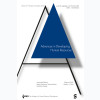
Advances in Developing Human Resources (ADHR)
deadline: 31.12.2026
category: Publication
Advances in Developing Human Resources (ADHR)
Advances in Developing Human Resources (ADHR) focuses on the issues that help you work more effectively in human resource development. The journal spans the realms of performance, learning, and integrity within an organizational context. Balancing theory and practice, each Issue of the journal is devoted to a different topic central to the development of human resources. ADHR has covered subjects as wide-ranging and vital as performance improvement, action learning, on-the-job training, informal learning, how HRD relates to the new global economy, leadership, and the philosophical foundations of HRD practice.
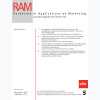
Recherche et Applications en Marketing
deadline: 31.12.2026
category: Publication
Recherche et Applications en Marketing
Recherche et Applications en Marketing (English edition) is a peer reviewed academic international journal publishing original research in the field of marketing in French and translated into English. It is a main reference for the development and dissemination of new concepts and new methods in marketing. Recherche et Applications en Marketing publishes articles covering any aspect of marketing, including consumer behaviour, communication, retailing, CRM, new product development and more. The journal publishes research articles, research notes, critical state of the art papers, and also articles offering perspectives from other disciplines which might be applied to marketing. Recherche et Applications en Marketing is an official journal of the AFM (French Marketing Association - Association Française du marketing). It is the leading French research journal in the field of marketing which has been published since 1986, and in both English and French since 2007.
